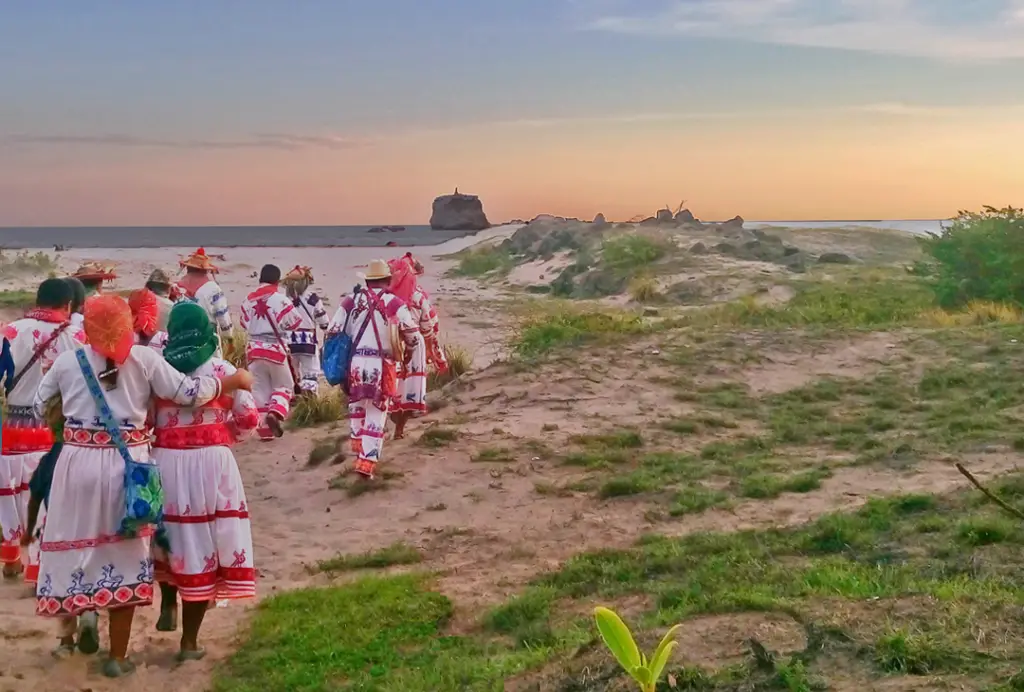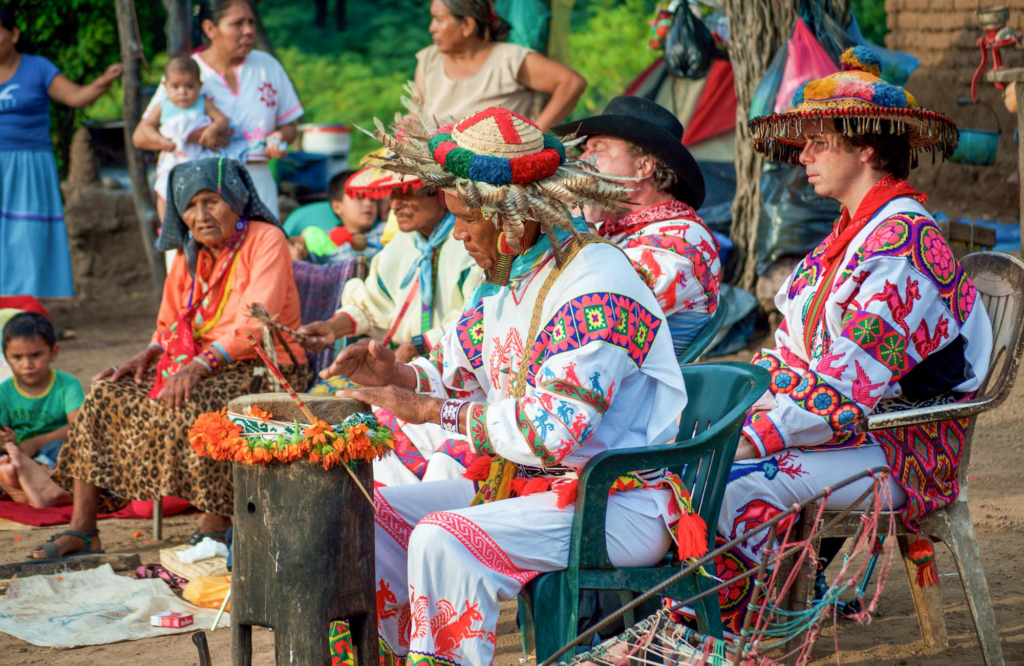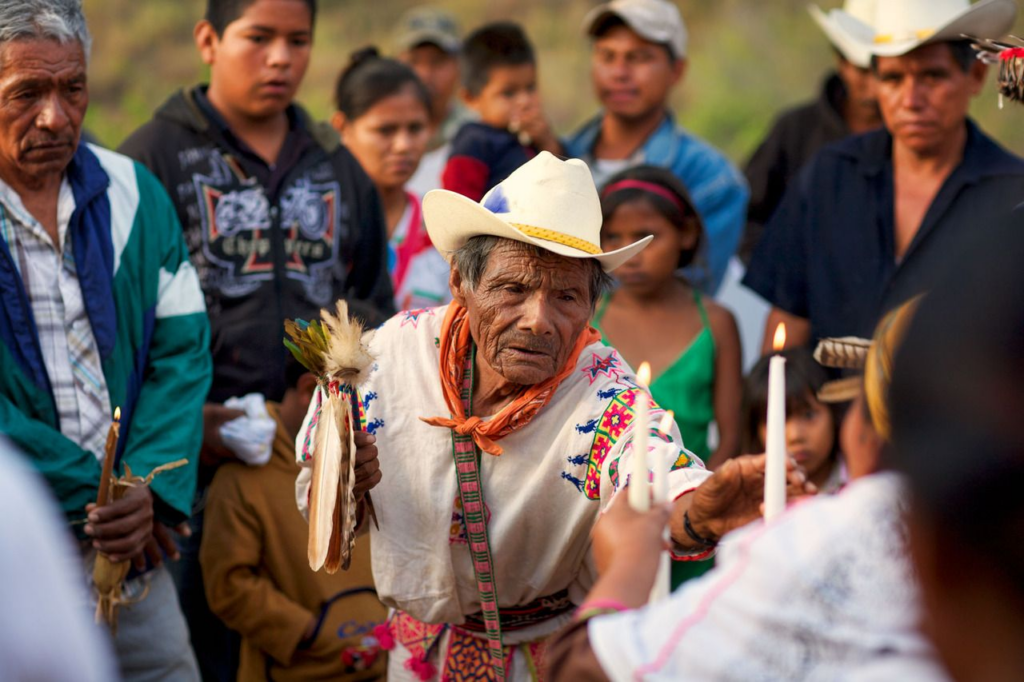Death in Huichol mythology
The Huicholes do not celebrate the Day of the Dead, however, they maintain a ceremony dedicated to the person who has just died and which consists of a ritual of “initiation or transition to the underworld.
Survivors of spiritual conquest and extermination, the Huicholes represent the sediment of the purest indigenous race. They are repositories of traditions regarding their origin, which they have managed to preserve over the centuries.
They continue to worship their gods; to his sacred and powerful peyote: sun god, deer god, corn god; father and lord of all signs, hallucinations, and begetter of life and death. They maintain strong connection ties with their natural environment, which helps them to get in touch with their ancestral deities.
Of an enigmatic beauty, Huichol art hides unexpected symbolism in its designs, techniques and materials, which transport us to a universe where each creation acquires a cosmogonic dimension, establishing a link between the sacred and the profane.
HUICHOL CULTURE “HONORS LIFE” INSTEAD OF CELEBRATING DAY OF THE DEAD
The Huichol culture does not have a celebration for the fall; although in September or October the Drum Festival or Yuimakuaxa is held, where the fruits of the land are appreciated, such as pumpkins, cucumbers, corn and cane, among others.

Cosmogony and religion
The Huicholes have their own conception of their origin and history, where their collective memory refers to those events that have a cosmic significance. For them, “cosmic or true” history is found embodied in myths, in art and in all the symbolic manifestations of the people.
One of the main characteristics of their religion is the association given between corn and deer, symbols of vital sustenance, and peyote, which is the most important means to transcend the profane world, and the most obvious material manifestation of the sacred. . Their mythology, in general, refers to these elements, which is why rituals, festivals, the material and temporal organization of life often revolve around them. The gods are considered as ancestors, while dead relatives can become semi-divinized.

Death
In this way, death represents one more bond with the sacred, a world that par excellence is the one concerning myths and gods, and everything that comes into contact with them is equally sacred; like the mara’akate (plural of maraakame), in charge of taking care of the objects of worship in the temples during the ceremonies or the peyoteros who participate in the pilgrimage to Wirikuta.

The gods are also called “ancestors” and it is common for them to be designated by some family term: father Sun, our grandfather Fire, great-grandfather Deer Tail, our Mothers of the water, our mother Earth, our great-grandmother Growth.
Families build ririkis (small shrines where ritual objects are kept) for their dead and their gods. Thus, the Huicholes live integrated in this sacred world, since they not only live with it through a great variety of mystical experiences, but also establish very real kinship relationships between one world and another.
The conception that the Wixaritari or Huicholes have of death is, to a certain extent, similar to that of other Mesoamerican groups, including the ancient Aztecs. When someone dies, their soul goes on a difficult and testing journey. They do not celebrate the Day of the Dead; however, they still maintain a ceremony dedicated to the person who has just died and which consists of an “initiation or transition to the underworld” ritual.
They have the belief that at the time of death the soul detaches from the body and rests on the head of the deceased in the form of cotton, smoke or wind. Death represents for them a purification process, where the soul has to go through five levels to descend to the underworld. The idea is that the first place where the soul meets its ancestors is in front of an amate tree.

Among the Huicholes, the bodies of the dead are sacred, but “ritually impure and untouchable”, and are out of common physical and social contact. The “myth of death” in the Wixarika culture states that all contact with the dead is prohibited. Therefore, the return of the soul that has been sent to the underworld is not allowed, after the rite of passage and farewell that takes place on the fifth day of death.
After a while, the dead man and his family cry and say goodbye, because the time for the last game has come. In any case, the living do not lose contact with the dead, either because he returns after five years, turned into rock crystal, or because he remains in the ranch of the dead; relatives will always be able to enter the ririki to worship and address him.





